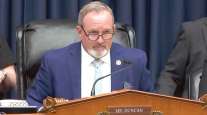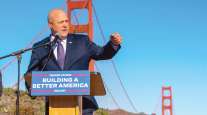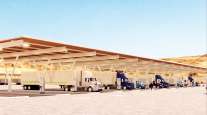Editorial: Dealmakers Strike a Big Deal
The $2 trillion infrastructure agreement President Donald Trump and congressional Democrats reached April 30 has been a long time coming, and we’re thrilled to see it. Voices on both sides of the aisle have maintained that infrastructure is a bipartisan issue. Seeing the top leaders from both parties agree on such a massive legislative effort indicated that those statements were more than just talk. Something has gotten done.
There’s more left to do, of course — such as find the funding to pay for it all. A meeting scheduled for a few weeks from now will tackle that issue, and we’ll likely be hearing a lot about lawmakers’ preferred revenue streams between now and then. Some endorse an increase in fuel taxes, while others back a vehicle-miles-traveled fee.
We believe that an increase in fuel taxes is the most efficient way to raise funding that is so desperately needed for our roads. Revenue from fuel taxes already goes to the Highway Trust Fund, which most in the industry know is at risk of being depleted. A simple increase in the amount of revenue going into this fund is a common-sense move.
The current taxes on diesel fuel and gasoline have not increased since the Clinton administration, but the efficiency of vehicles on the roads has greatly improved. Our roads and bridges shouldn’t have to suffer because of engineering gains in fuel efficiency. Rather, the funding system should in some way be tweaked to account for these gains.
For some, the notion of a vehicle-miles-traveled fee on vehicles that do not use fossil fuel is the answer here. Electric vehicles are the obvious target; since their drivers aren’t buying fuel, they’re not paying into the roads fund. It seems only fair that, going forward, a framework like this be created to account for the expected proliferation of these vehicles on the nation’s roads.
Indeed, it would be wise for lawmakers to take a forward-thinking approach as they advance this infrastructure package. But they shouldn’t lose sight of the here and now. Most vehicles will be burning diesel and gas for years to come, so the infrastructure deal they ultimately reach must include a boost in the decades-old fuel tax. Like roads and bridges themselves, these fuel taxes are in need of some updating. Let’s hope this is the next thing lawmakers get done.




